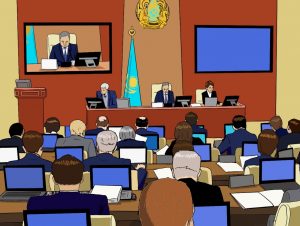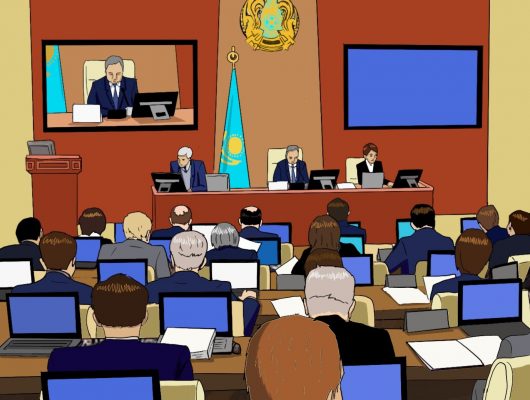
“HUMAN RIGHTS: 50 SHADES OF BLUE” The new exhibition by Artmeken Gallery and Soros Foundation-Kazakhstan
17/09/2020The Requisite Credo
22/09/2021Irina Smirnova, Deputy of the Mazhilis of the Parliament of the Republic of Kazakhstan, shares her thoughts on the problems of school education, the rights of teachers, the transparency and accountability of the state budget, and how the Soros Foundation-Kazakhstan began to formulate its position in civil society
Recently, while thinking about how long I have known the Soros Foundation-Kazakhstan, I realized that I have been working with its representatives for more than ten years. Back then, I lived in Almaty and was head of a school and of the Almaty branch of the Association of Teachers Ar-Namys. This was around 2008-2010. It was a difficult time for the education system and for me personally, but in the Foundation I found the moral support and expert community that I needed so much.
I understood from the outset that this collaboration was important both for me and for the whole teaching community, and I was right. We learned so much from Saule Kalikova, then Director of the Foundation’s educational program, to whom I am personally very thankful.
Strange as it may seem, it was working with the Foundation that helped me grow as a citizen of my country. I understood how it is both possible and necessary to talk about the rights of a teacher, a student, or a citizen of Kazakhstan—and, more importantly, what to do if these rights are violated.
EXPERIENCE HAS SHOWN THAT THE GOVERNMENT AND PARLIAMENT OF THE REPUBLIC OF KAZAKHSTAN TAKE THE OPENNESS AND TRANSPARENCY OF THE STATE BUDGET SERIOUSLY. IT IS IMPORTANT FOR THE STATE AND, MOREOVER, IT BRINGS REAL RESULTS.
The process was gradual. In particular, participation in meetings of the Kazakhstan Institute for Political Decisions, which cooperated with the Foundation, brought many benefi ts. We realized how important it is to speak the truth openly with the aim of improving people’s lives. I am sure I was not the only one to benefi t when the Foundation team contributed to changing our perceptions of our own rights.
Decisions, which cooperated with the Foundation, brought many benefi ts. We realized how important it is to speak the truth openly with the aim of improving people’s lives. I am sure I was not the only one to benefi t when the Foundation team contributed to changing our perceptions of our own rights.
Another signifi cant project of the Foundation is its support for the “Cyprus” discussion platform. It focused on the expertise of state legislative initiatives, business, social movements, the assessment of regulatory impact, and social research. The project team brought together active citizens, giving them an opportunity to speak out, and to seek the support of experts and the community. We can see the benefi ts of this project.
Another pivotal moment was my participation in the program about the openness and transparency of the budget. That my opinion might infl uence the country’s budget has greatly changed my attitude to my own role in society. As a result, with the help of the experts and representatives of the Foundation, I was able to address the government of Kazakhstan, conduct an analysis of the country’s open budget and accordingly make recommendations to the ministries on what the budget should be. Now this initiative is yielding some dividends: I recently participated in the creation of a virtual map of open budgets in Kazakhstan.
The map was created with the assistance of the Anti-Corruption Agency. All organizations that receive state funding are marked on the map. If you click on the organization you are interested in, you will see detailed information about budgetary spending. This allows the public to control the expenditure of public funds. In other words, the goal of budgetary openness and transparency has been implemented.
EACH EVENT OF THE SOROS FOUNDATION-KAZAKHSTAN HAS A SPECIALIST PRESENTATION, INCLUDING BY FOREIGN EXPERTS. THIS ALLOWS EVERYONE INTERESTED TO DELVE INTO THE PROBLEM AND SEE IT FROM A NEW PERSPECTIVE. THANKS TO THE FOUNDATION’S VALUES OF RESPECT AND OPENNESS, THE RANGE OF PARTICIPANTS IN EACH DISCUSSION IS UNLIMITED, MAKING THE PROCESS MORE EFFICACIOUS.

